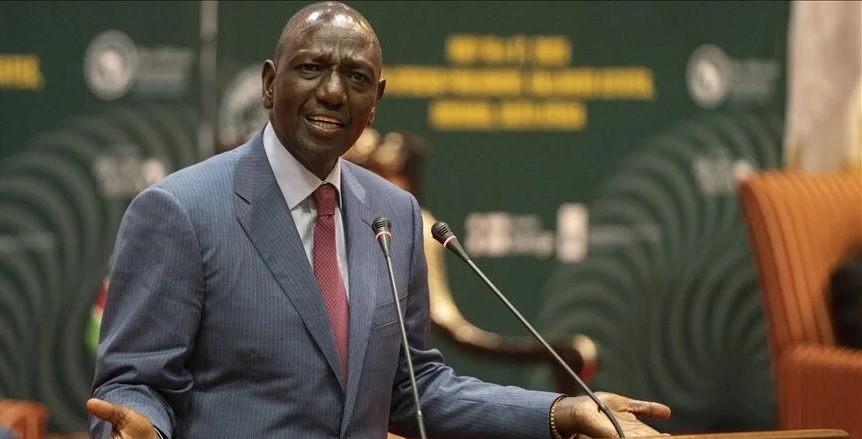By John Ikani
Kenya’s President William Ruto’s speech announcing that his country would be going visa-free for all foreigners beginning 1st January, 2024, was one of the most viral speeches that garnered significant attention and praise last year.
“It is time we realise that having visa restrictions amongst ourselves is working against us,” he told an international conference in October.
“We have visa regulations left, right and centre. When people cannot travel, we are all net losers,” Mr Ruto said to rousing applause.
Ruto The Sweet Talker?
With a fast-rising reputation as one who has his way with words, Mr Ruto has been consistent with the skilful use of language to persuade and mobilize his audience since the lead-up to the 2022 Kenyan general election.
Notably, his political rhetoric, such as the “Hustlers versus Dynasties” narrative, is being studied for its impact on Kenyan media and public discourse.
Delivering a speech last year in the capital Nairobi to mark Kenya’s 60 years of independence from Britain, Mr Ruto tacticfully struck the right chords by sacrificing explainers about how the visa-free policy is geared towards promoting tourism and easier travel on the altar of “bringing humanity home.”

He contended that historically, every individual has ancestral ties to Kenya’s Turkana County, deeming it illogical for native-born individuals to need permission to return to their homeland.
Considered the birthplace of humanity in Kenya, Turkana, located in the northwest of the country, boasts a wealth of fossils dating back over 100 million years.
Within this region lies Koobi Fora, a renowned paleoanthropological site and museum situated in Sibiloi National Park, along the eastern shores of Lake Turkana.
The area is internationally celebrated for its hominid fossils, which gained prominence following Richard Leakey’s groundbreaking discovery in 1972.
READ ALSO: Nigeria: NCDMB Lauds President Tinubu Oil Sector’s Executive Orders For Reinforcing NOGICD Act, SLA
Among the discoveries was a 2 million-year-old skull belonging to Homo habilis, an ancestor of modern humans, or Homo sapiens.
“It shall no longer be necessary for any person from any corner of the globe to carry the burden of applying for a visa to come to Kenya. To echo the call of the Turkana people to the world: ‘Tobong’u Lorre!’” Kenya has a simple message to humanity: ‘Welcome Home!’” Ruto said on December 12.
Game Changer
Kenya’s Visa-free announcement got many hyped up for the right reasons. It came at a time when only Rwanda, Seychelles, the Gambia and Benin allowed visa-free entry for just African travellers.
On its part, Angola introduced visa-free entry for 98 countries, including 14 African nations.
Notably, several countries including Ghana and South Africa, Botswana and Zimbabwe, as well as the Democratic Republic of Congo and Uganda introduced bilateral visa-waiver deals.
Meanwhile, thirty countries still require the citizens of more than half the countries on the continent to obtain a visa ahead of travel.
Libya, Sudan, Equatorial Guinea, Eritrea, South Sudan and Egypt are some of the states with the strictest visa requirements.
It is no wonder that Kenya’s announcement caught the world by surprise given nearly all countries globally operate a visa regime, meaning a visa is required for all to travel to these nations.
Free Of Visas But Not Formalities
Barely three months into the implementation of the visa-free policy, the fanfare that greeted its announcement is fast-waning.
Heritage Times [HT] can report that the policy is perceived by some as tricky and drawing pushback from others, with many describing it as “Hectic”.
On Thursday, one of Africa’s influential YouTubers – Wode Maya took to X (formerly known as Twitter) to air his frustration or to mildly put – dissatisfaction about the policy’s implementation.
He wrote: “Your Excellency @WilliamsRuto Kenya used to be visa-free for Ghanaian Citizens before you decided to make it free for all Africans which was the best speech ever but I now don’t understand why I have to apply & pay for a visa to go Kenya? I feel so confused or am missing something?“ [sic].
https://twitter.com/wode_maya/status/1765811382874681853
Maya’s dissatisfaction is one in the line of numerous others trailing Kenya’s implementation of its visa-free policy.
Earlier in January, prominent Zimbabwean journalist Hopewell Chin’ono criticized Kenya, stating, “Dear Africans, Kenya is not telling the truth when it says it is visa-free; it has made travelling more difficult for Africans who didn’t need a visa before.”
Dear Africans,
Kenya is not telling the world the truth when it says that it is now visa free, it is not!
It has in fact made traveling there more difficult for Africans who didn’t need a visa before, and I WON’T be going to Kenya unless if it is for work because of its new… pic.twitter.com/pMyukBVqAw
— Hopewell Chin’ono (@daddyhope) January 8, 2024
Malawian entrepreneur Jones Ntaukira shared similar sentiments, saying, “Until 24 hours ago, as a Malawian, I could just wake up, buy a ticket and fly to Kenya in the afternoon, visa-free. Now, Kenya has ‘removed visa’ for everyone, but everyone has to pay a $30 travel authorization fee 72 hours before travel. What? Hectic.” [sic].
So until 24 hours ago, as a Malawian, I could just wake up, buy a ticket and fly to Kenya in the afternoon, visa free. Now Kenya has “removed visa” for everyone visiting Kenya, but now everyone has to pay $30 travel authorization fee 72 hours before travel. What? Hectic
— Jones Ntaukira (@realjonzz) January 7, 2024
The Bone Of Contention – ETA
HT gathered that to implement the new policy, Kenya developed a digital platform known as the Electronic Travel Authorization (ETA) to ensure that all travellers to Kenya are identified in advance on an electronic platform.
Consequently, all travellers will obtain the ETA as they come. Kenya will still have the final say on whether to admit foreigners into the country or not after conducting a security background check on them through a security database shared with several nations.
Notably, the ETA can be obtained by submitting documents and paying a $30 (£23) processing fee. The requirement now applies even to citizens of countries that previously enjoyed unrestricted access to Kenya.
What’s more, citizens from countries in the East African Community (EAC) regional bloc, who are exempt from ETA for the next four months, may soon also be expected to apply to travel to Kenya.
The cost of the travel authorization is now lower for individuals who previously had to pay more than the new ETA fees.
For instance, Forouzesh Pietro, an Italian citizen, visited Kenya this year to reunite with his family in Malindi and is quite pleased with the new ETA system.
“Mine was a single entry, and so it was also cheaper than the old system, where I would pay $50 to enter the country each time I come here,” he told Aljazeera.
Delivering On Vision Of Borderless Africa?
Still in its infancy, the ETA needs tweaks to align with the bigger picture of easier travel on the continent.
Easing travel restrictions is necessary for the African Continental Free Trade Area, which aims to create a single market in Africa.
While laudable, Kenya’s visa-free policy in conjunction with those of Rwanda is not enough for a borderless Africa, Observes Bolu Abiodun, a blockchain and tech enthusiast.
“There are more barriers to intra-African exchanges beyond visa restrictions. Travelling within Africa, for one, is expensive compared to other regions of the world,” wrote Abiodun on Techpoint Africa.
“Another incredibly expensive thing to do within Africa is sending money. These issues stand in the way of creating a borderless Africa.
“While some startups are building fintech and travel solutions to these problems, there are deep infrastructural and policy-driven solutions that need African governments to take action.”



































